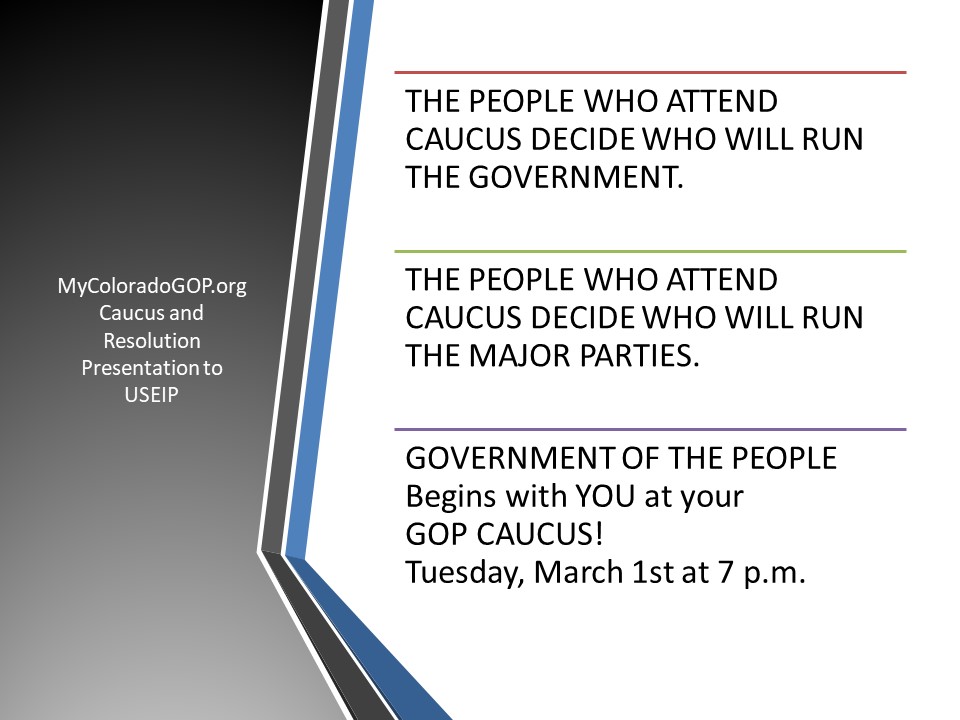
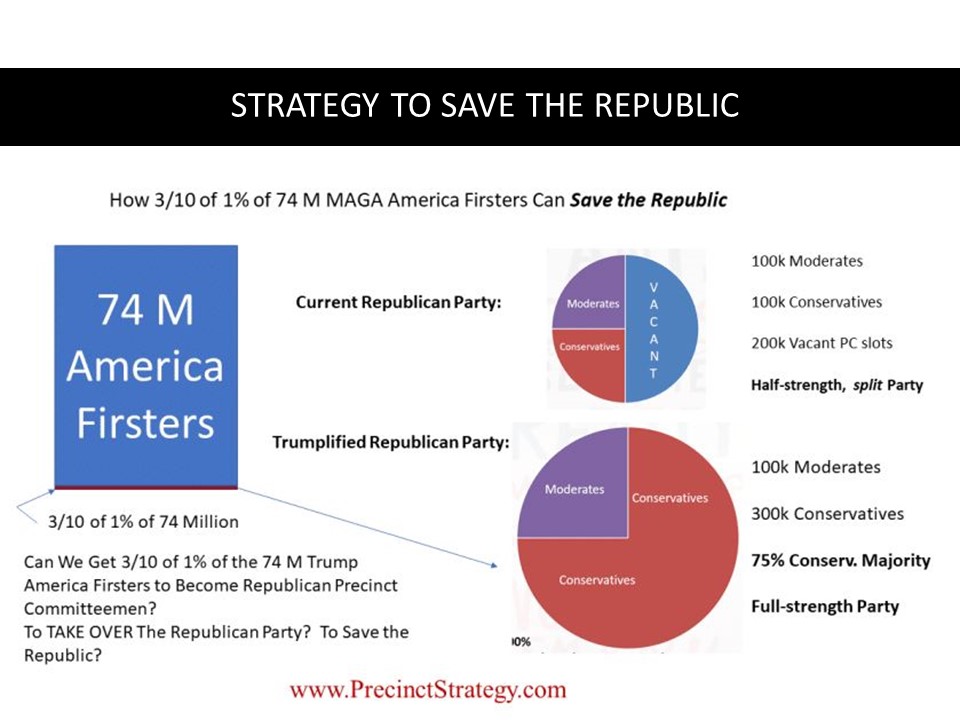

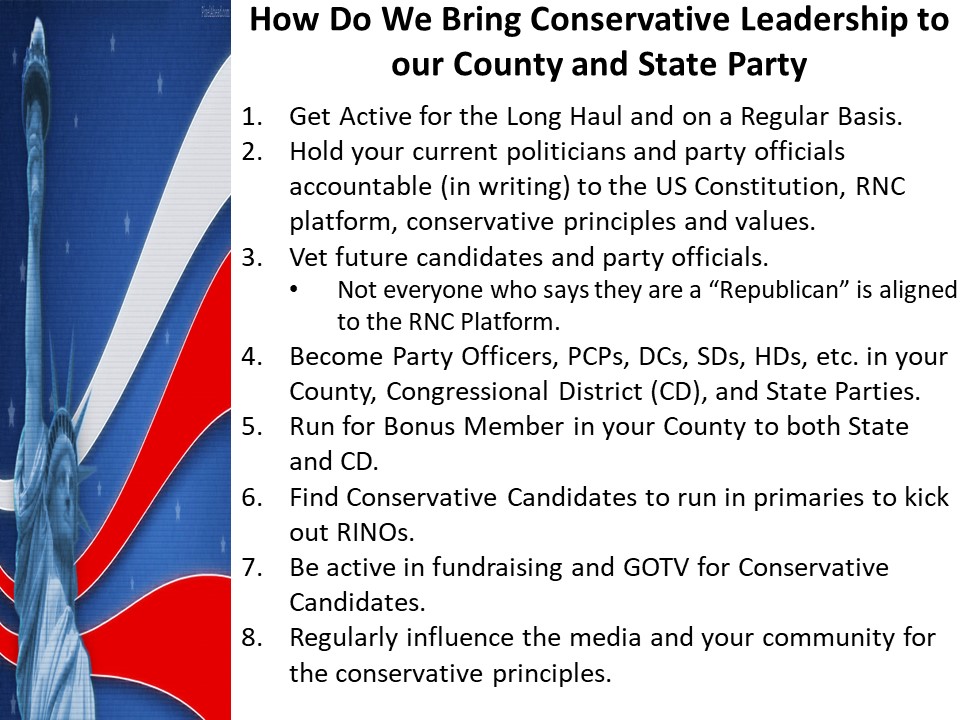
Page 5
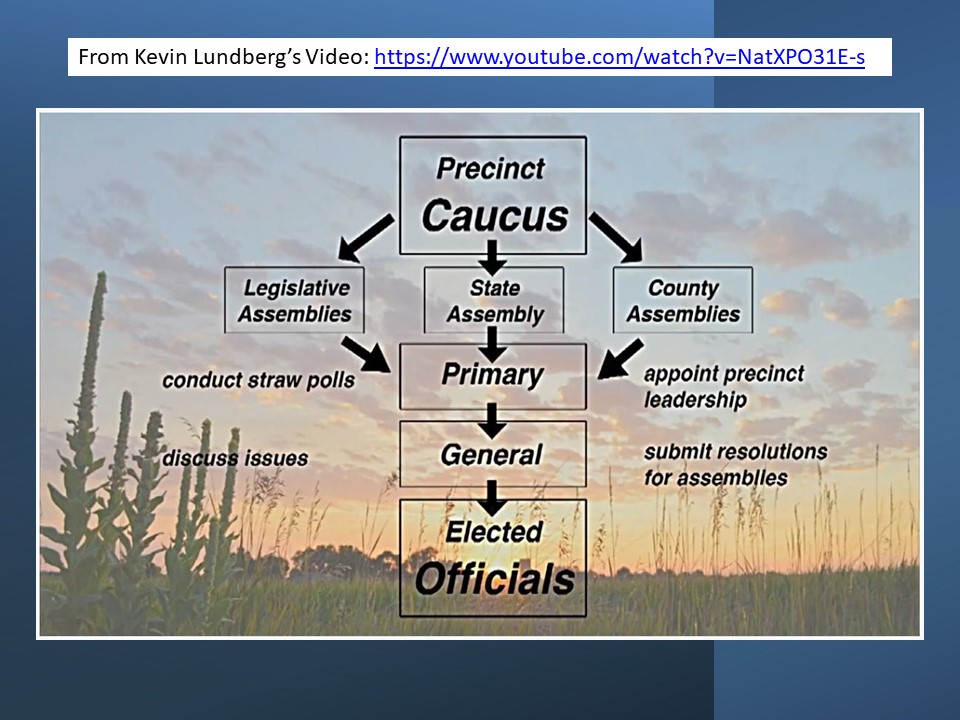
https://www.youtube.com/watch?v=NatXPO31E-s
Page 6
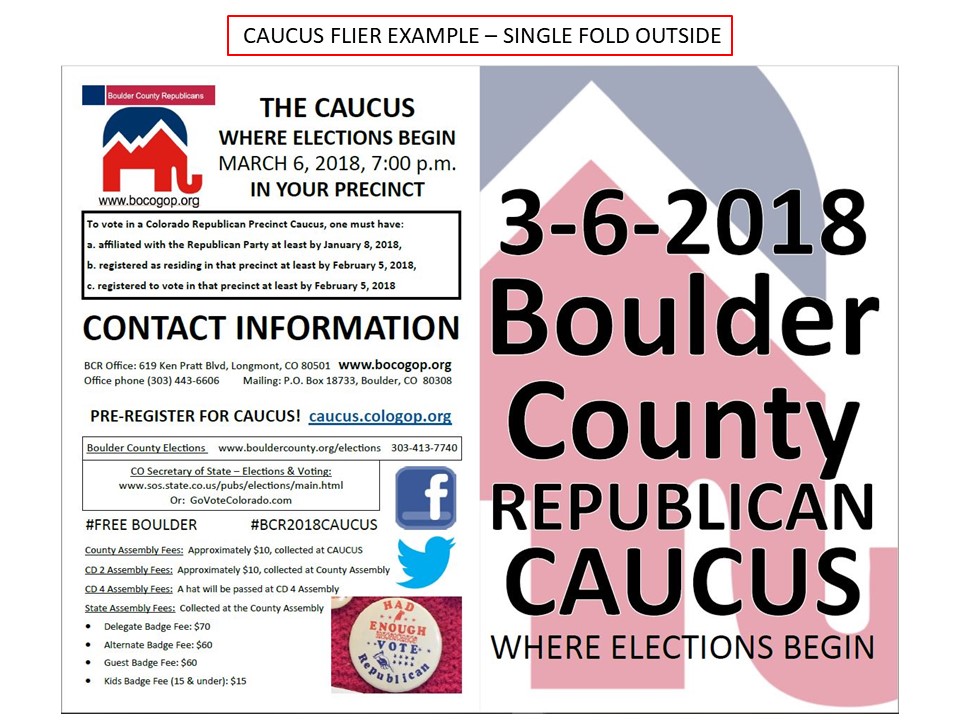
Page 7
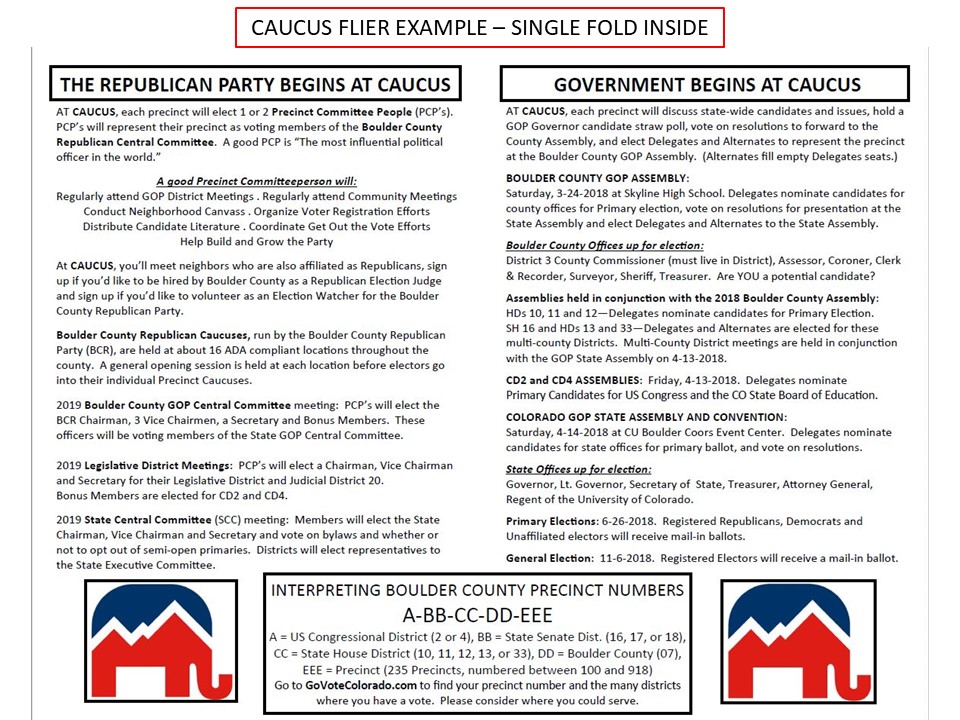
Page 8
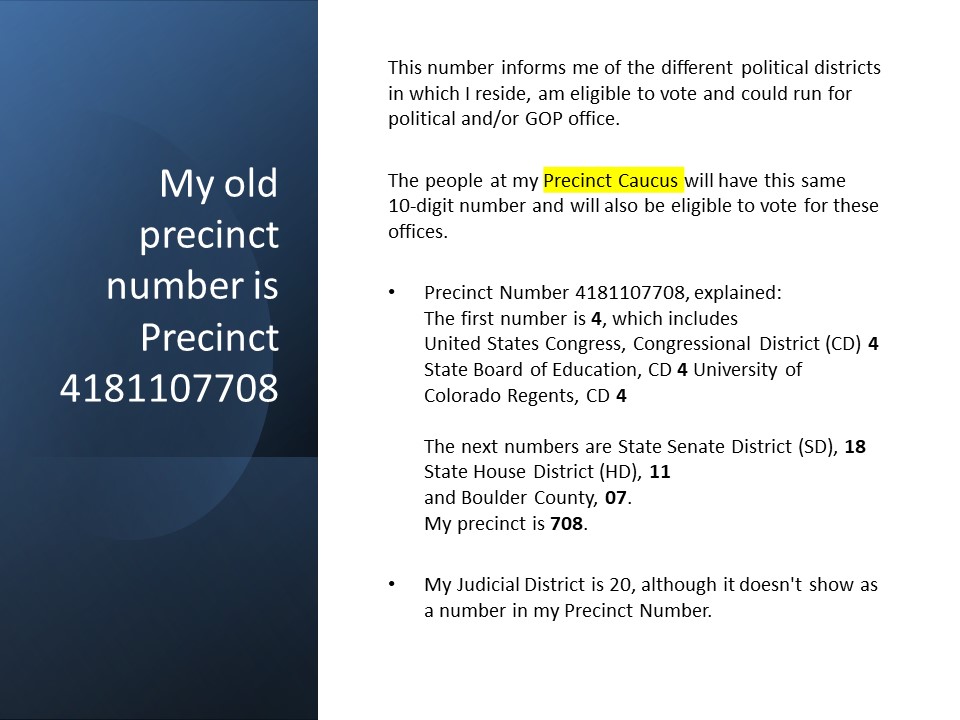
Page 9
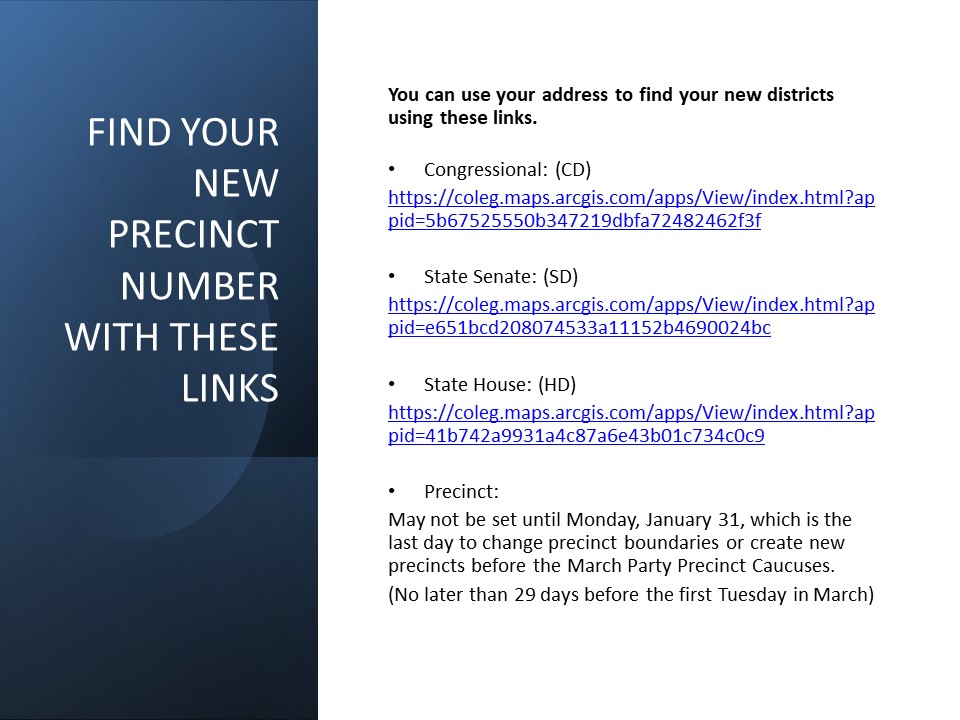
- Congressional: (CD)
https://coleg.maps.arcgis.com/apps/View/index.html?appid=5b67525550b347219dbfa72482462f3f
- State Senate: (SD)
https://coleg.maps.arcgis.com/apps/View/index.html?appid=e651bcd208074533a11152b4690024bc
- State House: (HD)
https://coleg.maps.arcgis.com/apps/View/index.html?appid=41b742a9931a4c87a6e43b01c734c0c9
Page 10
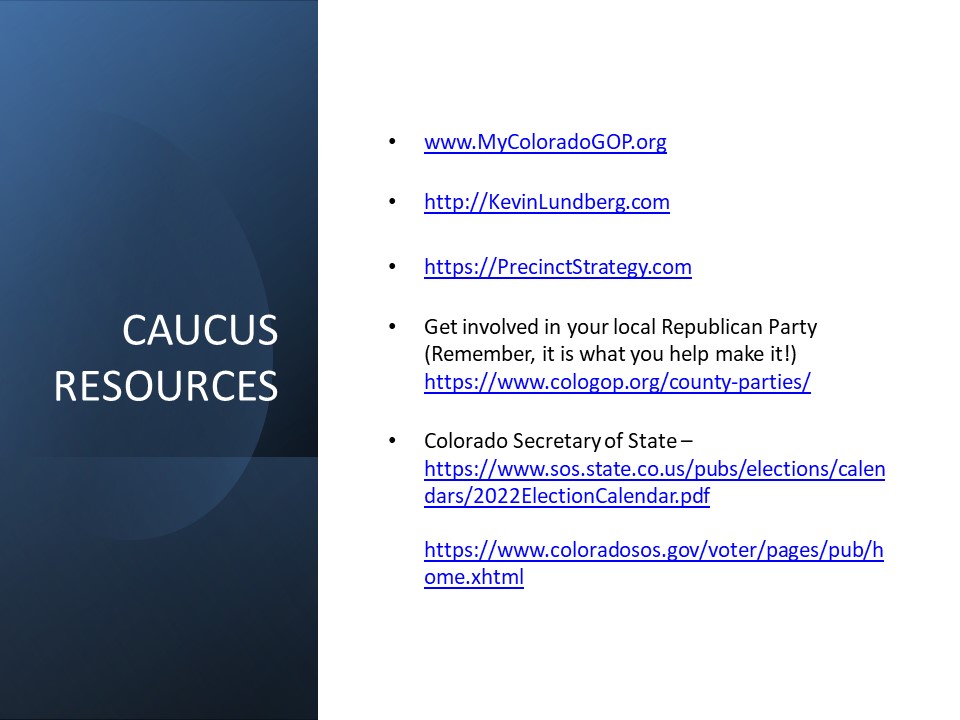
- www.MyColoradoGOP.org
- http://KevinLundberg.com
- https://PrecinctStrategy.com
- Get involved in your local Republican Party (Remember, it is what you help make it!)
https://www.cologop.org/county-parties/ - Colorado Secretary of State –
https://www.sos.state.co.us/pubs/elections/calendars/2022ElectionCalendar.pdf
https://www.coloradosos.gov/voter/pages/pub/home.xhtml
Page 11
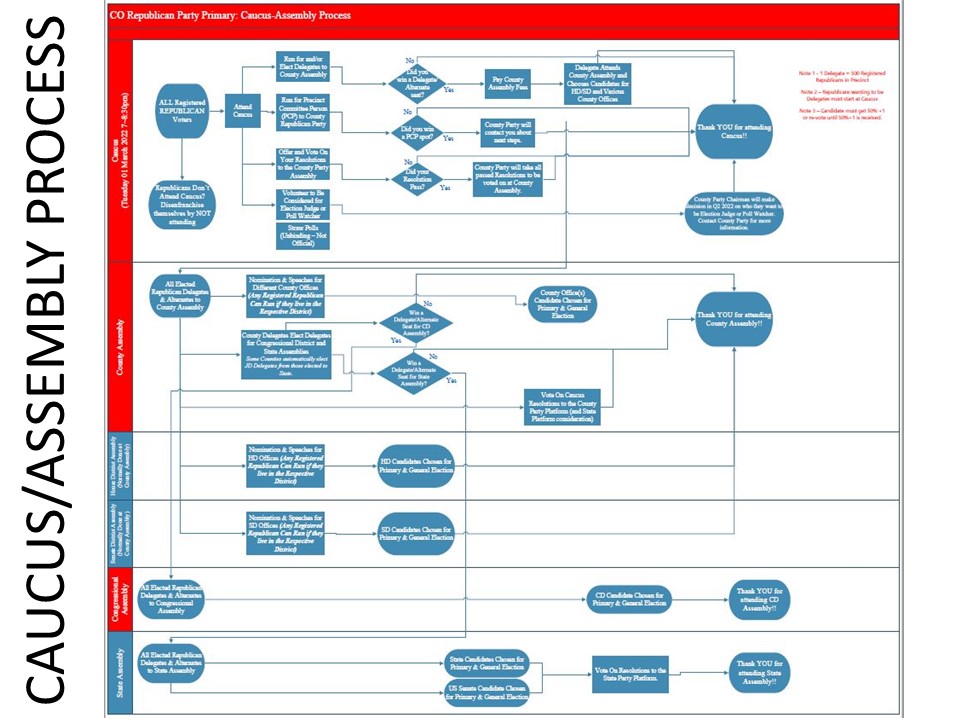
Page 12
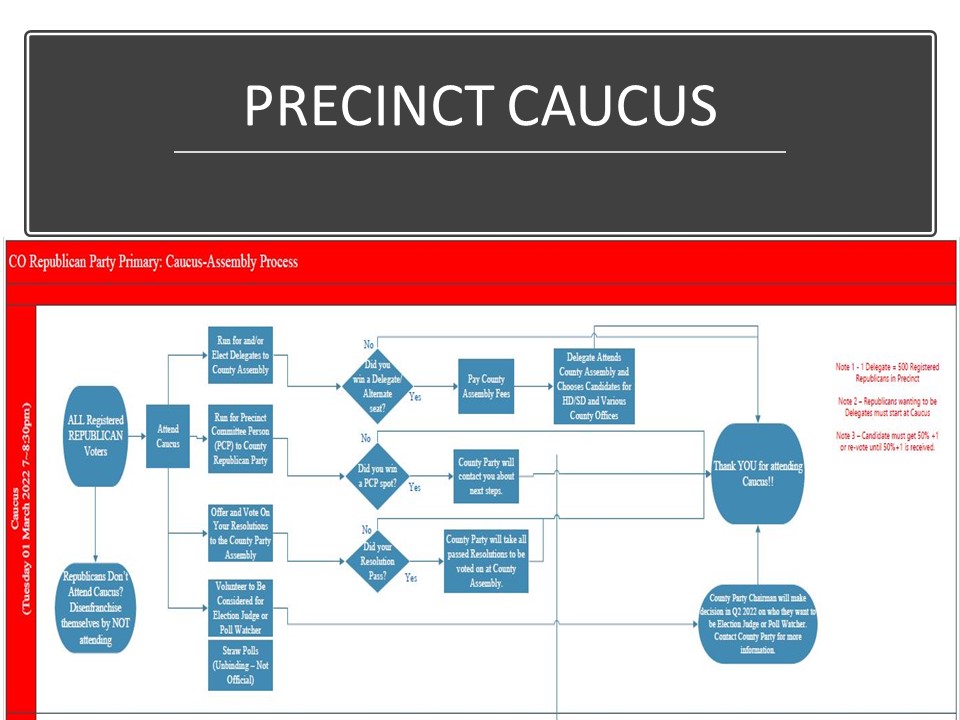
Page 13
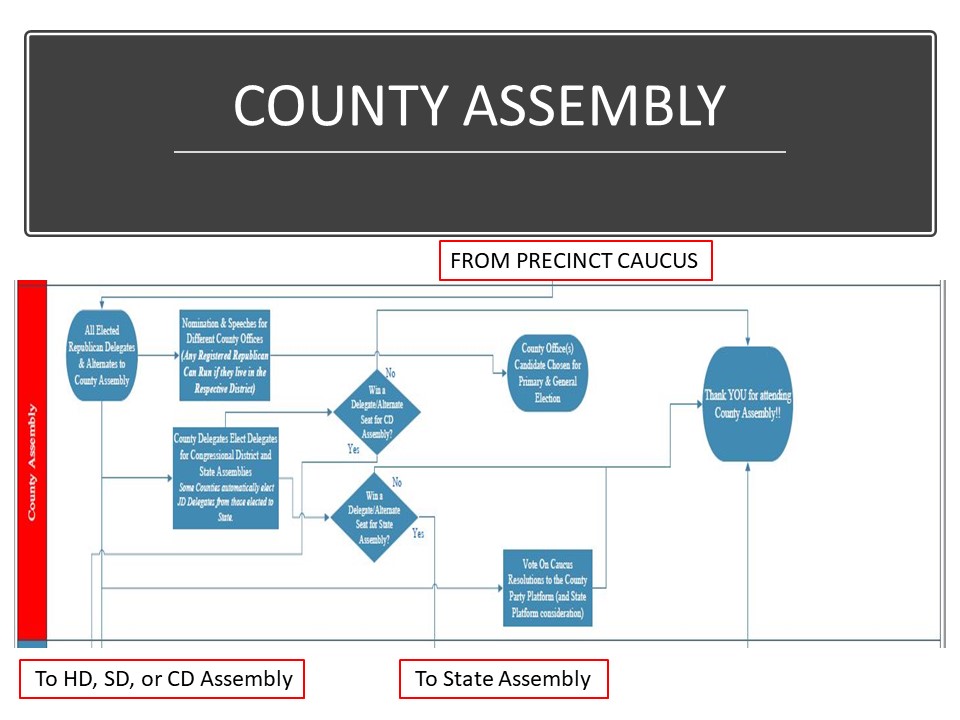
Page 14
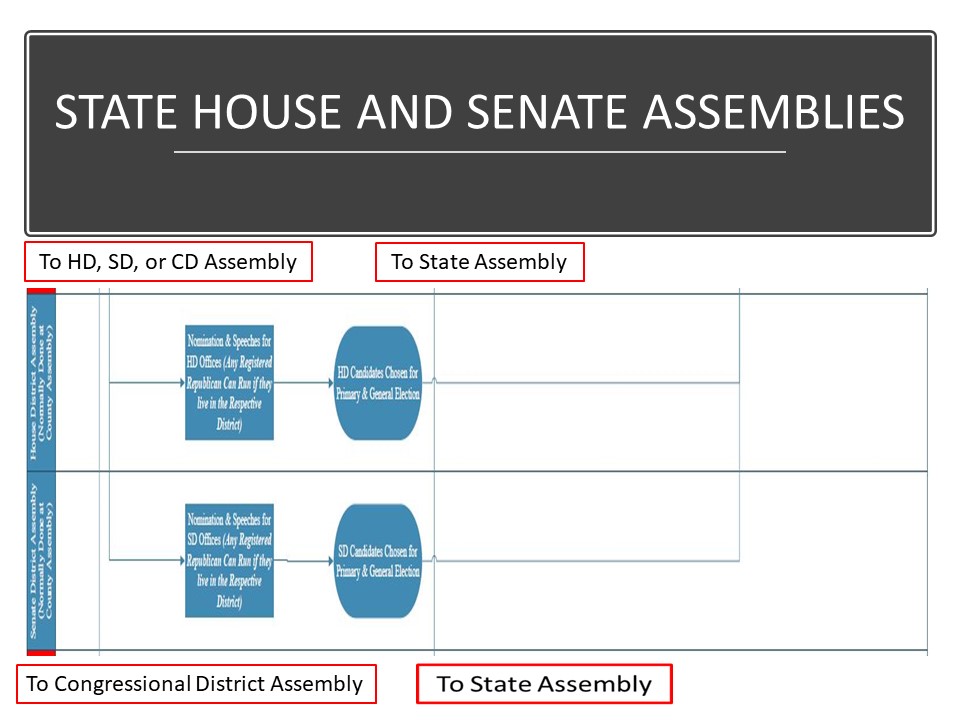
Page 15
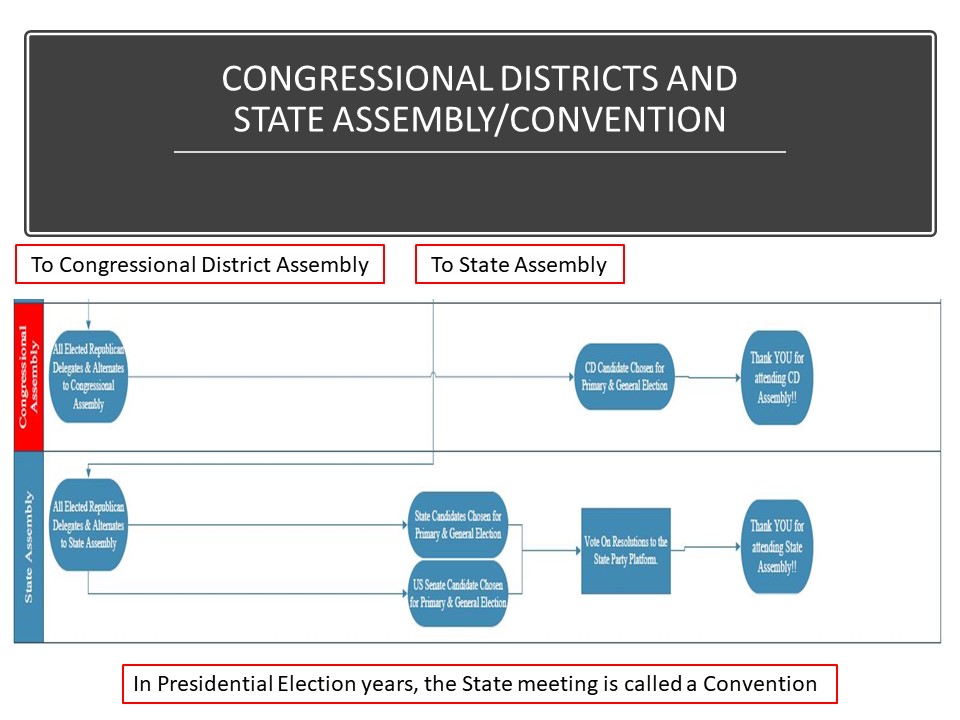
Page 16

Page 17
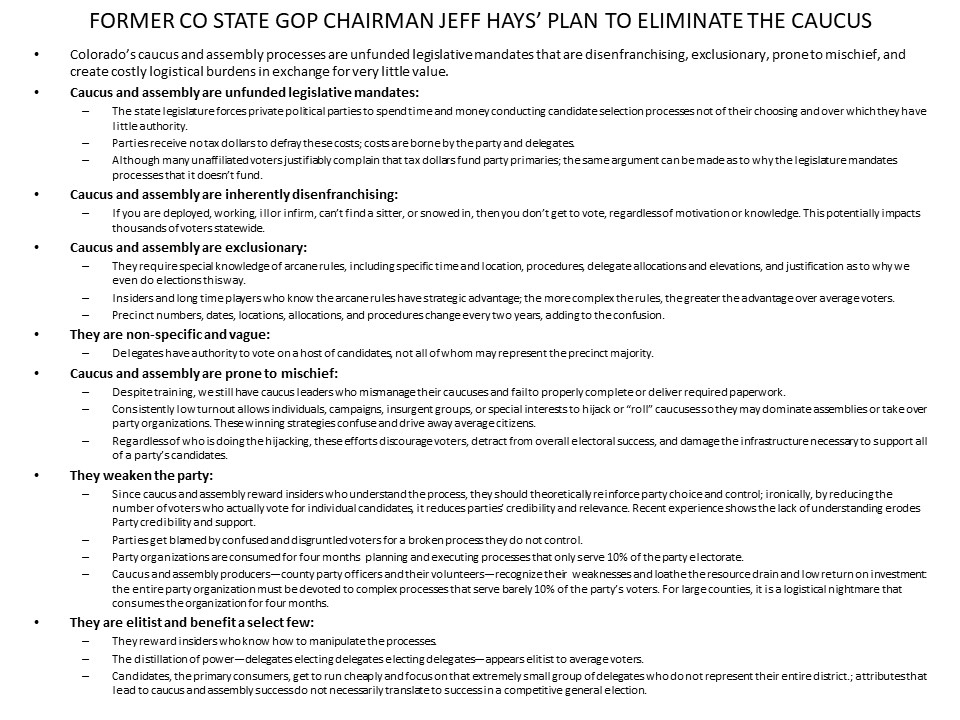
Page 18
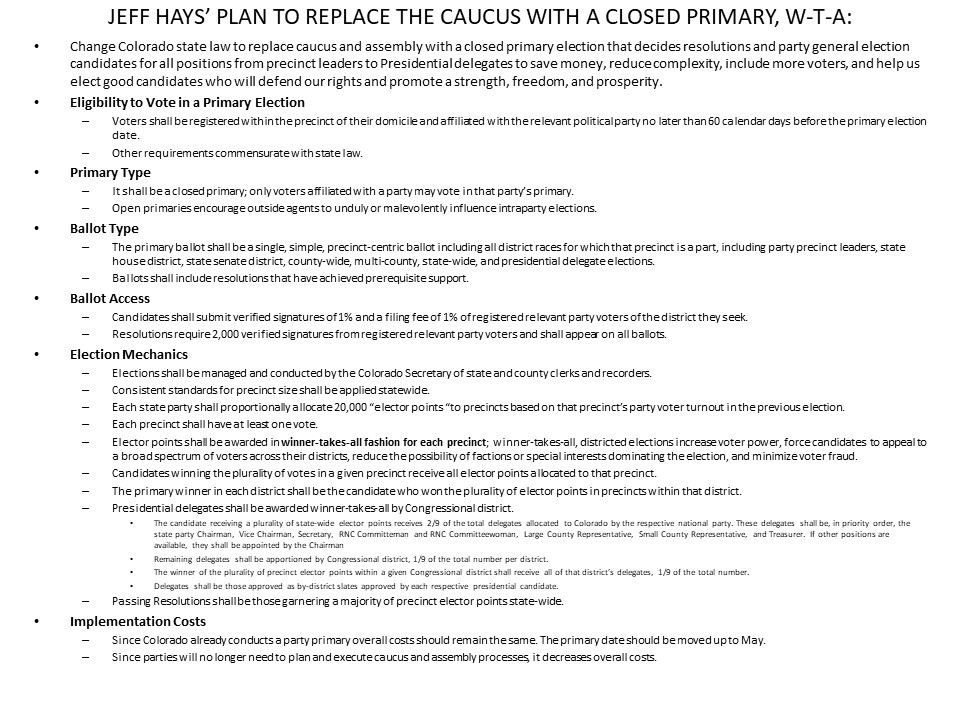
Page 19
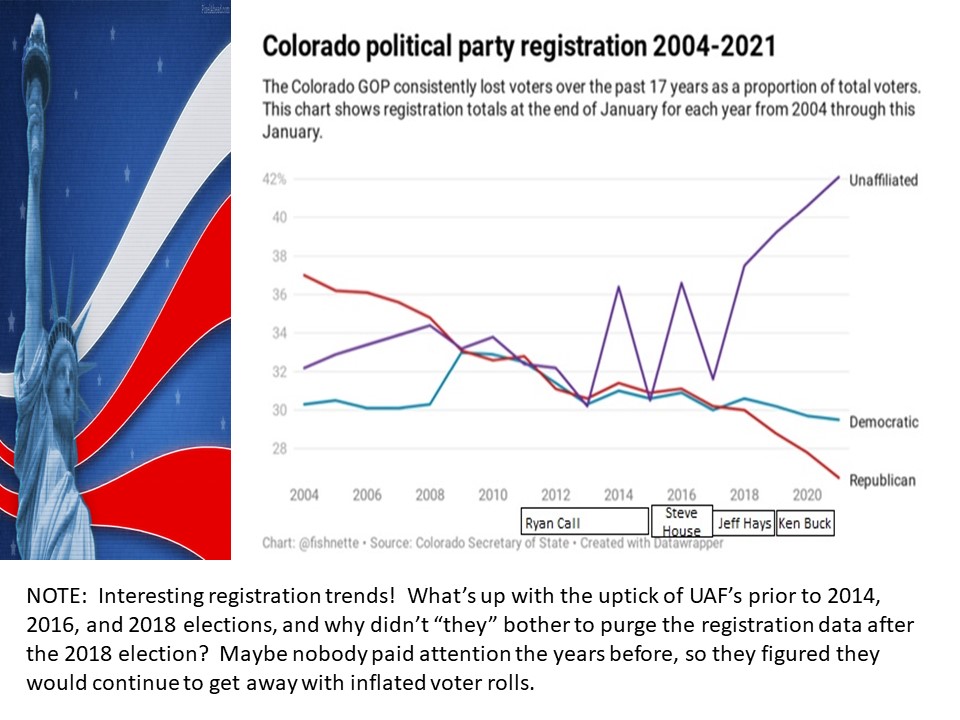
Page 20
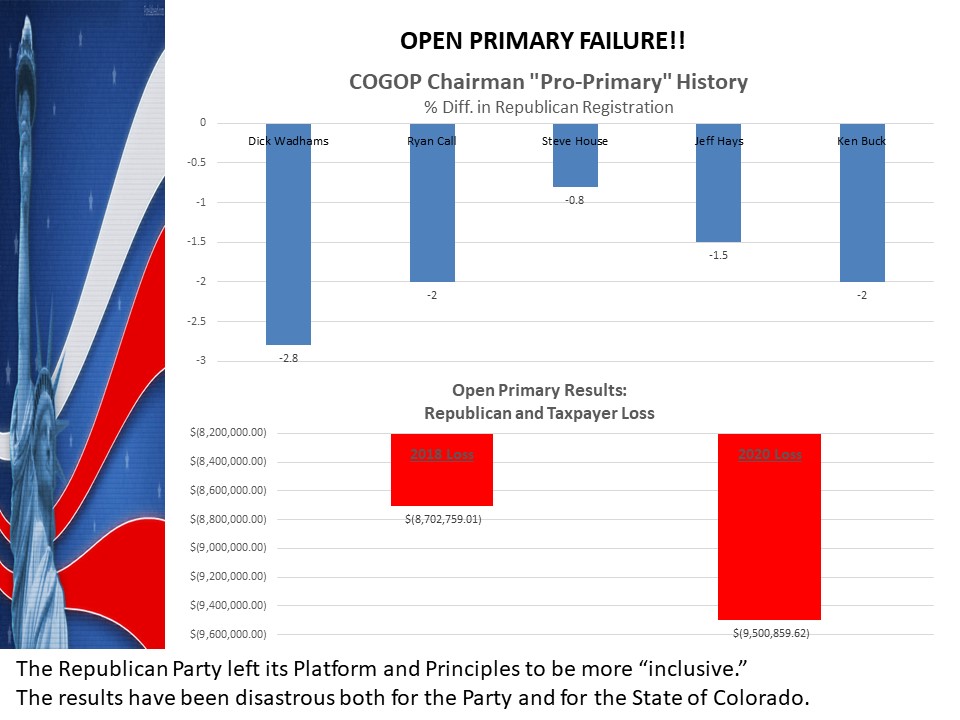
Page 21
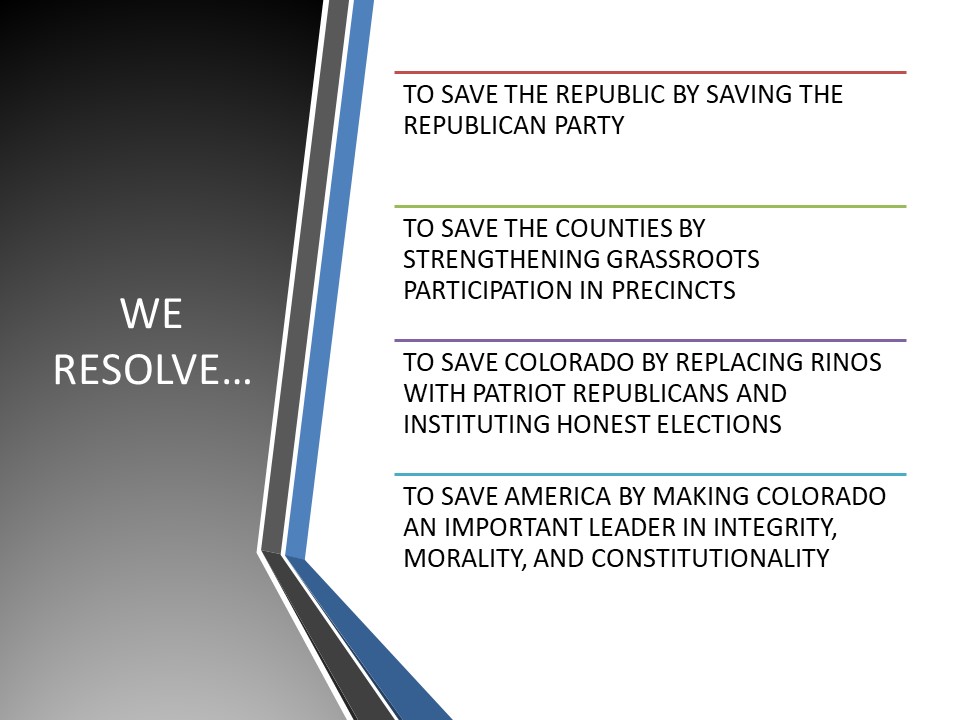
Page 22
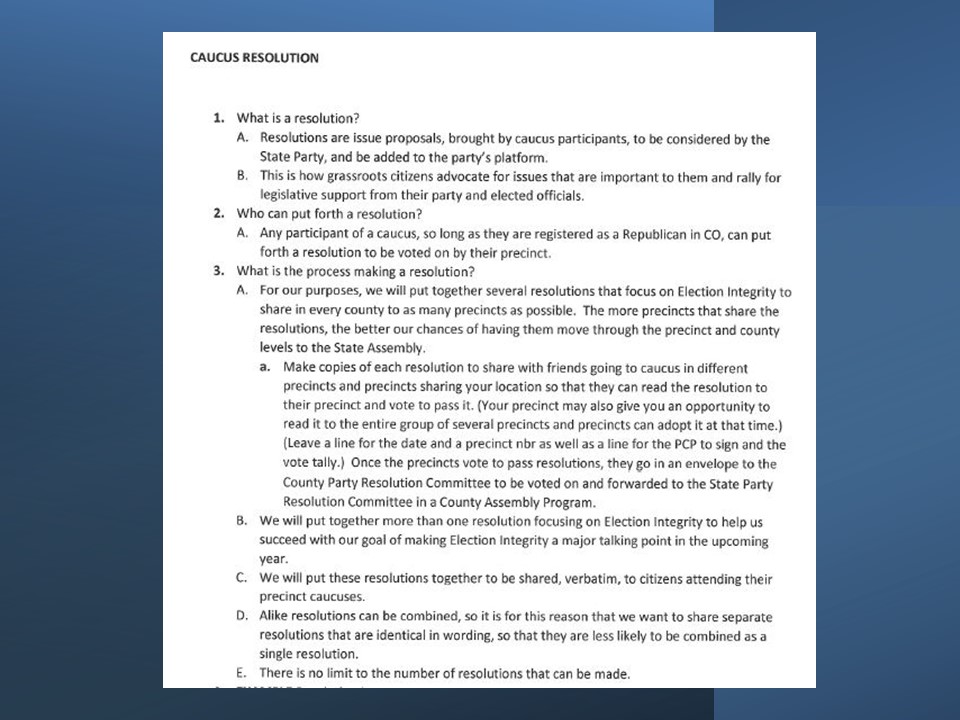
Page 23
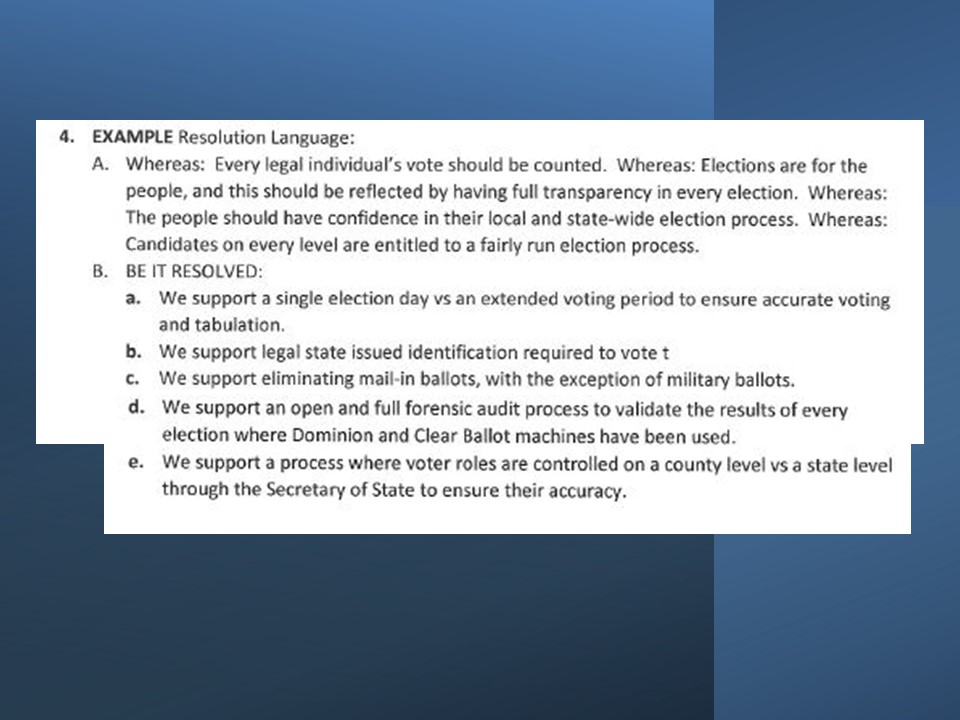
Page 24
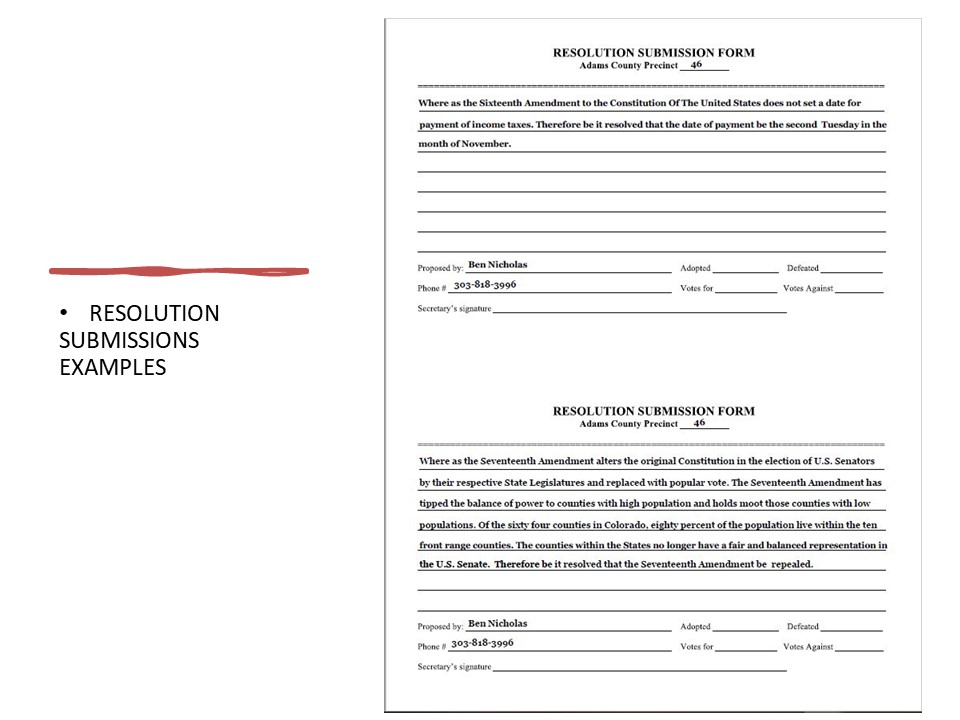
Page 25

Page 26
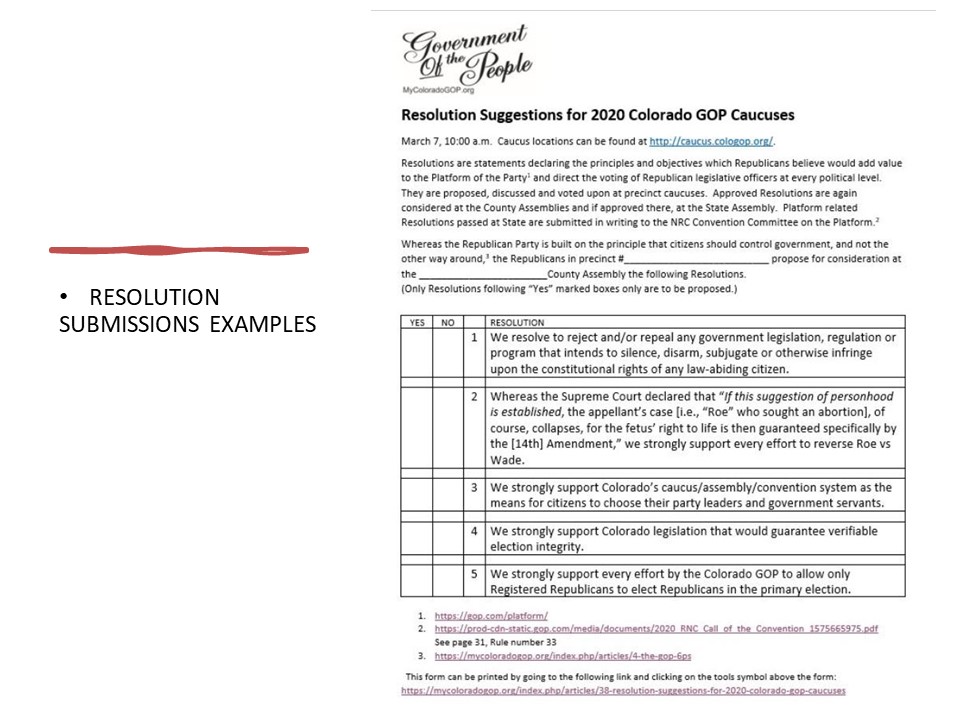
1. https://prod-static.gop.com/media/Resolution_Platform_2020.pdf
2. https://prod-cdn-static.gop.com/media/documents/2020_RNC_Call_of_the_Convention_1575665975.pdf See page 31, Rule number 33
3. https://mycoloradogop.org/index.php/2-my-gop/4-the-gop-6ps
Page 27
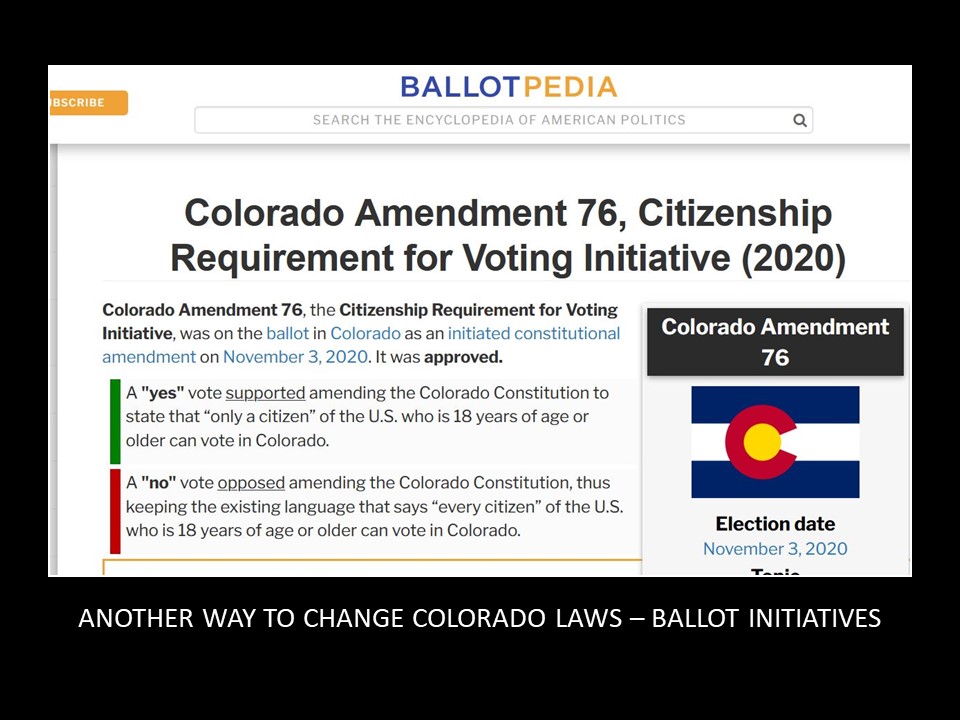
Page 28

BY KEVIN LUNDBERG
11/13/2021
The Claremont Institute has established a fund to pay the expenses for a federal lawsuit against the open primary system in Colorado. This is going through their Center for Constitutional Jurisprudence, under the leadership of Dr. John Eastman.
To contribute go to https://ccjlitigation.com and designate your donation to the Colorado Open Primary Constitutional Challenge Litigation Fund. If all Colorado citizens who think non-party voters should not be choosing party candidates gave something, we should be able to fund this critical need for honest and reliable primaries in Colorado.
The Claremont Institute is a non-profit 501(c)(3) organization that relies on the support of individual donors to continue its work. Gifts to the Claremont Institute are tax-deductible.
In 2000 the Supreme Court struck down California’s blanket primary by a 7-2 vote in a majority opinion authored by the late Justice Antonin Scalia, as an infringement on the First Amendment’s freedom not to associate.
Colorado’s Open Primary law is very similar and should also be declared an unconstitutional intrusion on a political party’s freedom not to associate. The First Amendment’s protection of the freedom to associate includes the freedom not to associate.
California Democratic Party v. Jones, 530 U.S. 567, 574 (2000)
Again, to contribute go to https://ccjlitigation.com and designate your donation to the Colorado Open Primary Constitutional Challenge Litigation Fund.
11/6/2021
Should Republicans Chose Republican Candidates?
In 2016 a ballot question (Proposition 108) opened up the primary elections to unaffiliated voters, giving them the choice of voting with a Republican or Democrat ballot. Today, with more unaffiliated voters than Republicans or Democrats, more primary ballots are sent to unaffiliated voters than to voters to either party. This is not a valid way for a party to select their nominee for the general elections.
Not going into all of the specific details of this system at this time, suffice it to say that this open primary system was unconstitutionally forced on to both major parties and last September the Republican State Central Committee unanimously voted to challenge this in Federal court. The Claremont Institute has established a fund to defray some of the expenses for this most valid legal action, as their Center for Constitutional Jurisprudence, under the leadership of Dr. John Eastman, is taking on this project.
This is a significant opportunity to set one aspect of Colorado’s election laws in proper order. If we are successful it will help set the voting systems in Colorado back onto the right track. I hope everyone will chip in to help. I will be sending them funds this week.
To contribute go to https://ccjlitigation.com and designate your donation to the Colorado Open Primary Constitutional Challenge Litigation Fund. The Claremont Institute is a non-profit 501(c)(3) organization that relies on the support of individual donors to continue its work. Gifts to the Claremont Institute are tax-deductible.
From: Jan Cook
Sent: Thursday, March 18, 2021 12:13 AM
To: John Fielding
Subject: Fwd: SCC Meeting - It's against the law to elect officers thru electronic voting Please Read
John,
Can you provide your comments on this assessment and perhaps provide them to the Douglas County Central Committee. Thank you.
In God and Liberty,
Jan Cook
Consultant, Strategist & Grassroots Leader
Educate | Inform | Mobilize people into action
This email address is being protected from spambots. You need JavaScript enabled to view it.
Begin forwarded message:
From: Nancy Pallozzi
Date: March 18, 2021 at 12:01:32 AM MDT
To: Nancy Pallozzi
Subject: SCC Meeting - It's against the law to elect officers thru electronic voting Please Read
March 17, 2021
To all patriots who believe in the rule of law I offer the following.
It is true that House Bill 21-1001 allows our party to use remote electronic voting methods to conduct business at our upcoming organizational meeting. But it is NOT true that remote electronic voting methods can be used in electing our party officers.
HOUSE BILL 21-1001
SECTION 1. In Colorado Revised Statutes, 1-3-103, add (11) as follows:
1-3-103. Party committees - repeal. (11) (a) NOTWITHSTANDING ANY PROVISION TO THE CONTRARY, A MEMBER OF A CENTRAL COMMITTEE MAY PARTICIPATE IN A CENTRAL COMMITTEE MEETING, INCLUDING A MEETING REQUIRED BY THIS SECTION, REMOTELY, INCLUDING CASTING THE MEMBER'S VOTE BY E-MAIL, MAIL, TELEPHONE, OR THROUGH AN INTERNET-BASED APPLICATION IF ALLOWED BY THE PARTY'S RULES.
Our bylaws (Rules) Article VIII, Section A carves out and prohibits the election of officers using technology.
ARTICLE VIII: VOTING AND PROXIES
Section A. Methods of Voting.
Voting, with the exception of the election of officers, shall be by voice, standing, hand vote, or by technology at the discretion of the Chairman unless a roll call is requested by forty-five or more voting members. In this case, roll shall be taken within the county delegations and the totals announced by the county chairman or his designee.
Our bylaws (Rules) Article VI, Section B, 1 specifically requires the election of officers be by secret ballot.
ARTICLE VI: NOMINATIONS AND ELECTIONS
Section A. Nominations.
1. Candidates for Chairman, Vice-Chairman and Secretary shall be nominated from the floor at the organizational meeting.
2. Nominations for any office shall be made only by members of the CRC in person or by a person acting as a proxy on behalf of a voting member.
Section B. Elections.
1. Officers shall be elected by majority vote using a secret ballot unless there is only one nominee for the office. In that case election shall be by voice vote.
Blacks Law Dictionary
The leading legal dictionary in the U.S. is Black's Law Dictionary.
What is SECRET BALLOT?
A way of voting where no one is influenced by seeing another person’s vote. Enclosed voting booths are used or each voter is away from the other so they can’t see what is being voted for.
Wikipedia
The secret ballot, also known as the Australian ballot or Massachusetts ballot, is a voting method in which a voter's choices in an election or a referendum are anonymous. ... Without revealing the votes to anyone, the voter folds the ballot paper in half and places it in a sealed box.
In conclusion, the election of officers can only be made by those SCC members in attendance and only by secret ballot. House Bill 21-1001 allows those SCC members choosing to participate remotely to vote on business matters other than the election of officers.
Leading people to believe that they will be able to vote for the officers remotely is a deceitful attempt to disenfranchise voters in the SCC. I would encourage all SCC members to attend in person and vote.
Ben Nicholas
Bonus Member
Adams County
-----Original Message-----
From: Jan Cook
To: Jan Cook
Sent: Thu, Mar 18, 2021 11:54 pm
Subject: Fwd: SCC Meeting - It's against the law to elect officers thru electronic voting Please Read
Dear Fellow Republicans,
We have received conflicting information about the upcoming SCC Meeting, which will be held on March 27th. I reached out to John Fielding, whom Douglas County Republicans respect for his thorough and consistent study and interpretation of our County and State by-laws. I asked John to review and provide his interpretation of a recent email sent to the SCC regarding the possible illegality of voting for state GOP officers through the use of electronic voting.
First, it is with great sadness that I share with you the people sending these messages have not disclosed to the electorate that they are supporters of one of the Chairman candidates, yet they complain about fair and transparent elections without disclosing this relevant detail.
Second, please review John Fielding’s assessment below on their claims “It’s against the law to elect officers thru electronic voting” that was sent to the SCC electorate.
In God and Liberty,
Jan Cook
Consultant, Strategist & Grassroots Leader
Educate | Inform | Mobilize people into action
e. This email address is being protected from spambots. You need JavaScript enabled to view it.
Begin forwarded message:
From: John Fielding
Date: March 18, 2021 at 5:13:53 PM MDT
To: Jan Cook
Subject: RE: SCC Meeting - It's against the law to elect officers thru electronic voting Please Read
Jan:
My assessment of Mr. Nicholas's analysis is that it is seriously deficient, and I reject his conclusions.
As a preliminary matter, you should note that HB 21-1001 authorizes the State Executive Committee to adopt bylaws to facilitate remote participation at meetings, including voting. Although Mr. Nicholas quoted part of Section 1 of HB 21-1001 ("Section 11(a)") in his material below, he omitted some highly relevant language:
(b) NOTWITHSTANDING ANY PROVISION TO THE CONTRARY, A STATE
PARTY CENTRAL COMMITTEE OR STATE PARTY EXECUTIVE COMMITTEE MAY
ADOPT PARTY RULES OR BYLAWS TO IMPLEMENT SUBSECTION (11)(a) OF THIS
SECTION. THE STATE PARTY CENTRAL COMMITTEE OR STATE PARTY
EXECUTIVE COMMITTEE MAY ADOPT SUCH PARTY RULES OR BYLAWS
WITHOUT REGARD FOR ANY NOTICE OR CALL REQUIREMENTS IN EXISTING
PARTY RULES OR BYLAWS. ...
The Emergency Bylaws adopted by the Republican State Executive Committee on January 21st are designed to implement the remote participation functions authorized by HB 21-1001. As such, they take precedence over the regular Bylaws and Rules of State Party. See Emergency Bylaw #14.
Unless the proponents of Mr. Nicholas's analysis are prepared to make an argument as to why the Emergency Bylaws should be disregarded or considered invalid, any analysis that omits references to them must be seriously incomplete. I note (1) that Mr. Nicholas makes no argument in the material below as to why the Emergency Bylaws should be disregarded, and (2) that, since many, if not all, of the County and District Organizational Meetings held earlier (especially those in large counties) were held wholly or partly under the authority of the Emergency Bylaws, any argument that would weaken the Emergency Bylaws could open up challenges to the regularity of all of those County and District Meetings.
So, in looking at the legality of electronic voting for Officers at the State Organizational Meeting, we have to start with the Emergency Bylaws (NOT the regular Bylaws that Mr. Nicholas quoted).
The provision most relevant to the STATE Org Meeting (coming up on 3/27) is Emergency Bylaw #12:
2021 EMERGENCY BYLAW # 12 – ALTERNATIVE CREDENTIALING/VOTING PROCESSES AT STATE ORGANIZATIONAL MEETING
Notwithstanding any provision of the Bylaws of the Colorado Republican State Central Committee, the State Chairman may provide for alternative credentialing and/or voting procedures to facilitate remote participation at the 2021 Republican State Organizational Meeting as permitted by House Bill 2021-1001. If the State Chairman determines to provide for such procedures, except to the extent required by exigent circumstances, he must announce such procedures at least 14 days before the 2021 Republican State Organizational Meeting by e-mail to all county and district chairmen, and all members of the Colorado Republican State Central Committee for whom the state party has an email address and by posting notice of such procedures to the State Party website at www.cologop.org.
Proxies are not permitted in Central Committee meetings where remote participation is permitted.
The plain language of the Emergency Bylaw provides for voting procedures to allow remote participation. I think that this language gives Chairman Buck the authority to permit electronic voting, subject to a notice requirement. Since the State Org Meeting is scheduled for 3/27, the Emergency Bylaw would require email notice by no later than 3/13. I have a mass-distributed email from Lx Fangonilo dated the afternoon of 3/12 (copy attached) which gave notice that the Global Mobile Txt2Vote platform would be used for the State Org Meeting. Given that Mr. Fangonilo works for Chairman Buck as State Party Executive Director, I think this satisfies the notice requirement of the Emergency Bylaw as far as electronic voting is concerned.
Mr. Nicholas seems to believe that there is something special about the election of State Officers that requires in-person voting. However, I do not see anything in the quoted language of HB 21-1001 or the Emergency Bylaws that supports this distinction. As noted, the House Bill and Emergency Bylaws make the language Mr. Nicholas quotes from the regular SCC Bylaws irrelevant.
For the foregoing reasons, I respectfully reject Mr. Nicholas's conclusion that electronic voting for State Officers is illegal. Please note that I do not necessarily endorse any particular methods or procedures that State Party may choose by which to conduct any electronic vote. I'm just saying that, in my opinion, HB 21-1001 and the Emergency Bylaws support a properly-conducted electronic vote for State Officers.
You may share this email as you wish.
Please let me know if I can be of further help,
Regards, John Fielding - Bonus SCC Member, Douglas County and Vice Chairman SD 4
This article summarizes Peg Cage and Ben Nicholas's final conclusions about the use of technology in the election of officers:
WHO IS DISENFRANCHISING WHOM?
Page 3 of 8





